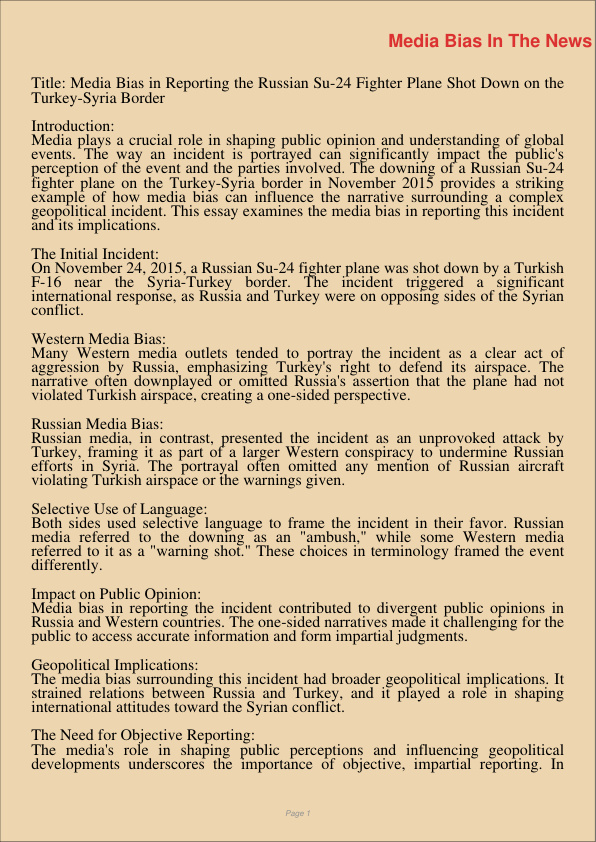Media Bias In The News About The Russian Su24 Fighter Plan Shot Down On The Border Between Turkey And Syria
Jan 9, 2024
24 fighter plan shot
russian su
Finance & Accounting
Environmental Studies
Title: Media Bias in Reporting the Russian Su-24 Fighter Plane Shot Down on the Turkey-Syria Border
Introduction: Media plays a crucial role in shaping public opinion and understanding of global events. The way an incident is portrayed can significantly impact the public’s perception of the event and the parties involved. The downing of a Russian Su-24 fighter plane on the Turkey-Syria border in November 2015 provides a striking example of how media bias can influence the narrative surrounding a complex geopolitical incident. This essay examines the media bias in reporting this incident and its implications.
The Initial Incident: On November 24, 2015, a Russian Su-24 fighter plane was shot down by a Turkish F-16 near the Syria-Turkey border. The incident triggered a significant international response, as Russia and Turkey were on opposing sides of the Syrian conflict.
Western Media Bias: Many Western media outlets tended to portray the incident as a clear act of aggression by Russia, emphasizing Turkey’s right to defend its airspace. The narrative often downplayed or omitted Russia’s assertion that the plane had not violated Turkish airspace, creating a one-sided perspective.
Russian Media Bias: Russian media, in contrast, presented the incident as an unprovoked attack by Turkey, framing it as part of a larger Western conspiracy to undermine Russian efforts in Syria. The portrayal often omitted any mention of Russian aircraft violating Turkish airspace or the warnings given.
Selective Use of Language: Both sides used selective language to frame the incident in their favor. Russian media referred to the downing as an “ambush,” while some Western media referred to it as a “warning shot.” These choices in terminology framed the event differently.
Impact on Public Opinion: Media bias in reporting the incident contributed to divergent public opinions in Russia and Western countries. The one-sided narratives made it challenging for the public to access accurate information and form impartial judgments.
Geopolitical Implications: The media bias surrounding this incident had broader geopolitical implications. It strained relations between Russia and Turkey, and it played a role in shaping international attitudes toward the Syrian conflict.
The Need for Objective Reporting: The media’s role in shaping public perceptions and influencing geopolitical developments underscores the importance of objective, impartial reporting. In situations where complex international events unfold, it is crucial for the media to provide a balanced account of the facts.
Media Responsibility and Accountability: Media outlets have a responsibility to present news in an unbiased manner, adhering to journalistic ethics. Biased reporting not only misinforms the public but can also escalate international tensions and contribute to conflicts.
Conclusion:
The downing of the Russian Su-24 fighter plane on the Turkey-Syria border serves as a stark reminder of how media bias can significantly influence the way international incidents are perceived by the public. In an age of instant information dissemination, the responsibility of media outlets to present a balanced, accurate, and unbiased account of events becomes increasingly important. In the case of this incident, the biases in reporting not only fueled tensions between nations but also hindered the public’s ability to make informed judgments about a complex and sensitive international issue. It underscores the necessity for responsible and impartial journalism in our interconnected world.
